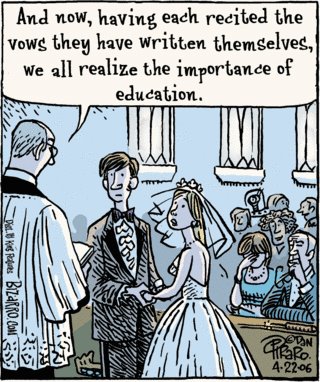April 26, 2006
Who is the decider?
OK, it's time for our occasional over-interpretation of a cartoon. This one was submitted by Pekka Karjalainen to the Fellowship of the Predicative Adjunct:
Zeno at Halfway There interprets this cartoon in terms of layers of irony:
In his Bizarro cartoon panel for April 22, 2006, Piraro takes a worthwhile shot at couples who inflict their self-written wedding vows on their guests. ... [T]ake a look at the minister's words: “And now, having each recited the vows they have written themselves, we all realize the importance of education.” Whoa, what a burn on the feckless bride and groom! However, ... what exactly is the referent for the participial clause “having each recited the vows they have written themselves”? It's obviously supposed to be the bride and groom, but the actual subject of the sentence is “we,” the spectators and the celebrant at the wedding. Piraro has committed misplaced modification and left a participial phrase dangling.
Zeno thinks that Dan Piraro has committed this error unwittingly, and thus fallen victim to "the Iron Law of Nitpicking", which Zeno expresses this way:
You are never more likely to make a grammatical error than when correcting someone else's grammar.
I'm not so sure.
I can read the cartoon in one of two ways:
1. Piraro imagines that the minister commits this breach of grammatical etiquette unwittingly, while sincerely praising the couple's compositions; or
2. Piraro imagines that the minister is using the dangling adjunct on purpose, as an echoic criticism of the couple's home-made vows.
Under interpretation #1, the minister falls victim to Zeno's "Iron Law"; under interpretation #2, no one does. Under either interpretation, the cartoonist Piraro himself is innocent of linguistic fault. When I first read the cartoon, I interpreted it in mode #2; after some reflection, I switched to mode #1; I didn't think of Zeno's interpretation until I read his blog entry. What do you think?
Zeno ends with a plea for mercy:
In the present instance, it behooves me to keep this post short, thereby reducing the likelihood that I will commit some egregious error therein. When you, Dear Reader, find the inevitable faux pas, please try to be gentle as you denounce my sin in the comments.
Not having the temperment of a nitpicker, I'll just observe that Zeno has independently re-invented the Hartman/Skitt/McKean Law of Prescriptivist Retaliation, which itself was independently discovered by three different linguistic adventurers within a short span of time in 1999:
Jed Hartman ("Words & Stuff", April 20, 1999): "Any article or statement about correct grammar, punctuation, or spelling is bound to contain at least one eror".
Perchprism/Skitt: (alt.usage.english, April 26, 1999): "Any post correcting an error in another post will contain at least one error itself" or "The likelihood of an error in a post is directly proportional to the embarrassment it will cause the poster".
Erin McKean: (Verbatim Magazine, Summer 1999) "Any correction of the speech or writing of others will contain at least one grammatical, spelling, or typographical error."
And Jason Streed of Finches' Wings has observed that a closely-related concept was explored in 1909 by Ambrose Bierce:
In neither taste nor precision is any man's practice a court of last appeal, for writers all, both great and small, are habitual sinners against the light; and their accuser is cheerfully aware that his own work will supply (as in making this book it has supplied) many "awful examples" — his later work less abundantly, he hopes, than his earlier. He nevertheless believes that this does not disqualify him for showing by other instances than his own how not to write. The infallible teacher is still in the forest primeval, throwing seeds to the white blackbirds.
When it comes to language, none of us is the decider, and yet each of us is.
[Note: Zeno's reference to "the referent of the participial clause" is a non-standard use of the term "referent" -- usually that term would apply only to words and phrases that (are taken to) refer, such as nouns and pronouns. In this case, I think that most linguists would prefer to talk about "the subject of the clause" rather than the "referent of the clause". I wasn't going to say anything about this, since it's clear enough what Zeno means, and I'm not a nitpicking kind of person; and for that matter, as a mere phonetician I might have missed a new syntactic theory out there according to which participles refer to their subjects. But since several readers have written in to raise the point... ]
Posted by Mark Liberman at April 26, 2006 06:43 AM